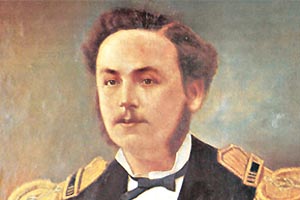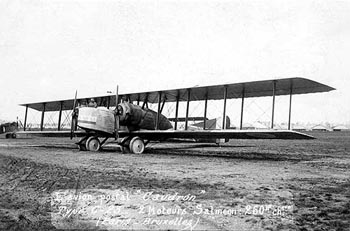He was born in Valparaiso on August 14th, 1843. His parents were Scottish merchant marine Federico Condell and Peruvian Manuela de la Haza. He studied in Valparaiso, first at the Sagrados Corazones (sacred hearts) school and then in the Ingles (English) school of the same city.
At age 15 he joined the Naval Academy as a cadet, becoming a part of what would later be known as the “class of heroes” alongside Arturo Prat, Jorge Montt and Luis Uribe, among others. In July of 1861, he was named midshipman after graduating from the academy.
His first action was at the naval battled of Papudo (November 26th, 1865) and Abtao (February 8th, 1866) in the war against Spain.
In December of 1868, he participated in the mission that repatriated the remains of Bernardo O’Higgins from Peru to Chile.
He then served aboard the Abtao and Chacabuco ships. In the following years, he sailed the Juan Fernandez archipelago and the south of the country. At the end of 1876, aboard corvette Esmeralda, he traveled to Easter island and then Tahiti.
When the Pacific war was unleashed (April 5th, 1879), Condell had already risen to the rank of Lt. commander (in command of the Abtao) and was in charge of blocking the port of Iquique.
Then, he was transferred to be the commander of gunship Covadonga, and on May 21st, 1879, he dealt a decisive blow to the Peruvian navy, causing the loss of frigate Independencia at the naval battle of Punta Gruesa.
After this victory, Condell was promoted to commander (June 16th, 1879) and named commanding officer of gunship Magallanes.
In this position, he participated in the assault and taking of Pisagua (November 2nd, 1879). Later, in 1880, he assumed command of monitor Huascar (which had been captured), participating in the blockade of the port of Callao and other battles of the Pacific war.
On May 21st, 1881, he was promoted to captain, and in December of that year he was sent to Europe. Upon his return in 1884, he was an aggregate of the Ministry of the Navy and then he took ship as commander of armored frigate Cochrane.
In early 1887, he was transferred to be the commander of frigate Blanco, where he briefly assumed as head of the National Fleet. He had to leave the position due to a serious illness. However, he rose to the rank of rear admiral in August. He died in Quilpue on November 24th of that same year.








